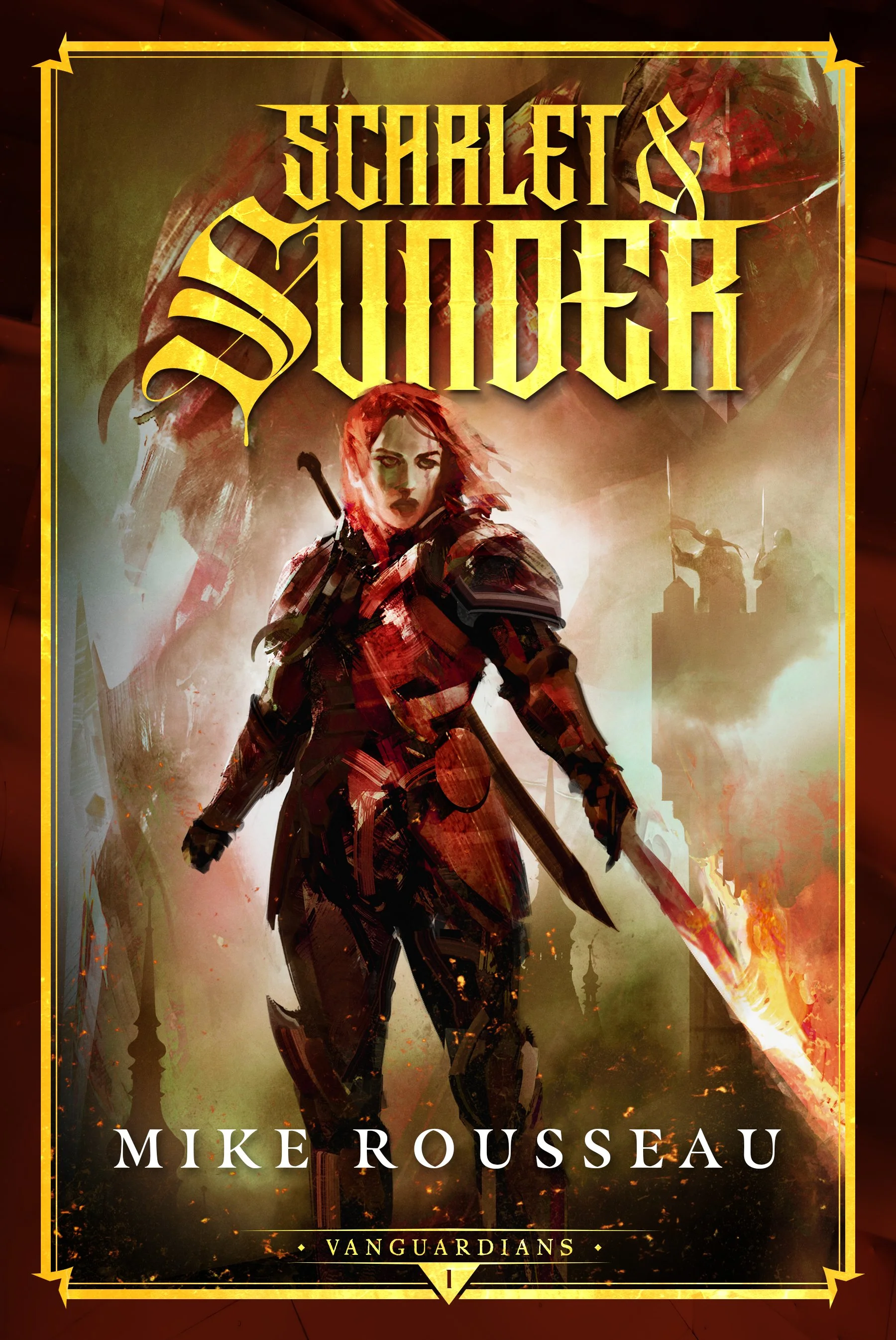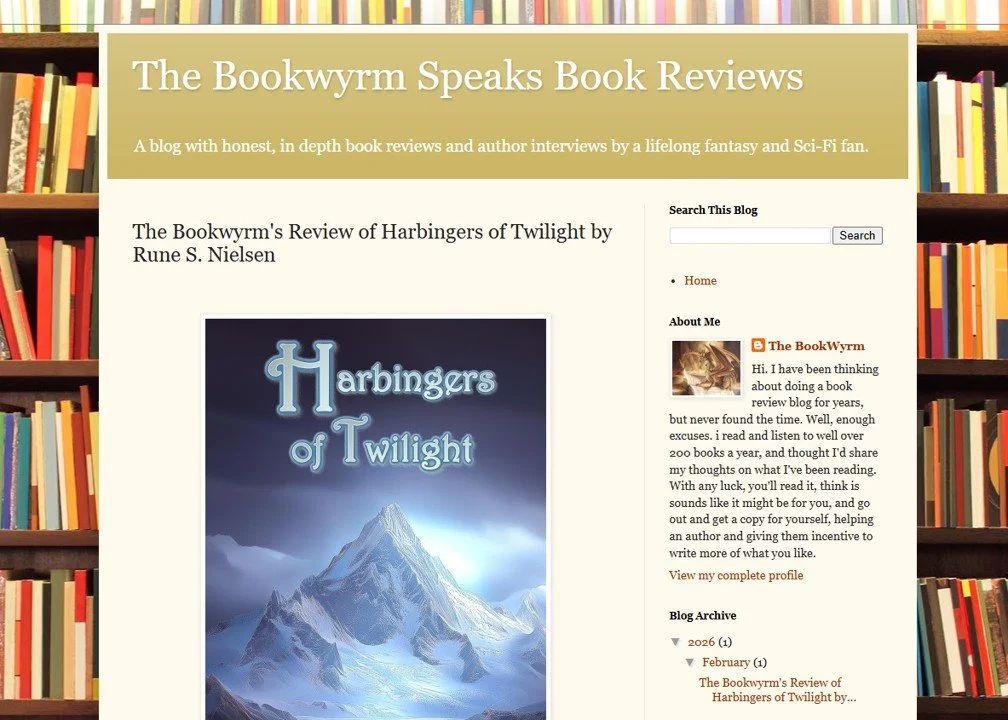I was lucky to get an interview with Mike Rousseau, the author of Scarlet and Sunder, and one of the semifinalists in #SPFBO9.
Please, tell us a bit about yourself…
I’m a former army brat born in the 80s. My parents were avid gamers and readers, so I grew up with fantasy, science fiction, and video games as a core part of my childhood. My father and I used to watch Robotech on Saturday mornings, and that was my gateway into anime and the start of my love affair with giant robots, which would eventually lead to the creation of Scarlet and Sunder decades later.
I’ve lived all over Canada. Currently, I reside in Vancouver, British Columbia, where I work as a video game designer and writer. On the side, I write genre fiction, study swordplay, and pursue way too many hobbies and interests. I always have too much going on.
“There’s some heavy content, but ultimately, I think it’s a hopeful story, with some epic set pieces and really heartfelt moments to balance out the grittiness. ”
Why should I buy your SPFBO9 entry?
Scarlet and Sunder is for folks who grew up watching Power Rangers and yearn for something similar, but a bit more adult. That was what I was looking for, and I couldn’t find it, so I wrote it. Giant magic-fueled war machines face off against titanic monsters, providing the backdrop for a very human story that explores the stress and strain of being the world’s protector, the dangers of letting your job become your whole identity, and the fear every generation has of being replaced by the next.
There’s some heavy content, but ultimately, I think it’s a hopeful story, with some epic set pieces and really heartfelt moments to balance out the grittiness. If you love tense mentor/apprentice relationships, road trips, and subtle references to video games, movies, and anime, this is the book for you.
What got you into writing? And how long have you been doing it?
My history with writing has been all over the place. I started writing around the age of 7, where I created stories loosely based on elements from my favorite Atari 2600 games. I was fascinated by the art and story of games like Swordquest, Yar’s Revenge, and Pitfall. They’re responsible for opening my mind up creatively at a young age.
In my teens, I shifted into writing adventures for my Dungeons & Dragons groups, eventually coming back to linear narrative to write some god-awful fan fiction in my early 20s. At that point, I was sure I wanted to work in video game journalism or as a game writer, so I went to college, got a degree, and started doing freelance work in both fields. That didn’t last, as I experienced some life and career setbacks that took me away from writing for a long time. I ended up coming back to long-form prose in 2017 as a way to open up job opportunities in the game industry. I continued writing novels long after that need had come and gone.
Have you participated in the SPFBO before and where did you hear about the competition?
This is my first time applying to any writing competition, outside of a screenwriting contest a college professor entered me into without me knowing, which I won somehow.
When I made the decision to self-publish Scarlet and Sunder, I started looking for recommendations to get an idea of what was hot in the genre. I was recommended Sword of Kaigen by M.L. Wang. At the time, I didn’t know it was self-published. Later, I found out it was an SPFBO winner, and that was when I first learned about the contest.
Why did you choose to write fantasy?
I mostly focus on fantasy because I love writing fight scenes. You can learn so much about a character based on the way they approach combat and the weapons and techniques they employ. It’s the ultimate “show, don’t tell.” My fight scenes are designed to either move the plot forward or develop a character and push them along an arc. There’s no superfluous fighting for the sake of fighting in my work, as much as I can help it.
Fantasy is the perfect environment for the kind of character-driven action I love. The worldbuilding opportunities allow an author to get really creative.
Which other author has had the biggest influence on your writing?
The Legend of Drizzt books by R.A. Salvatore were my Lord of the Rings. I burned through those as a teenager. Salvatore writes his fight scenes with just enough detail to let the reader picture the action clearly without bogging them down in minutia or leaving them confused. It’s the perfect balance between vagary and specificity, and that’s the ideal that influenced my own writing the most.
If you were to win the SPFBO, what impact do you think this would have on your writing career?
I’m honestly not sure. When I think of what I want to get out of SPFBO, I think more about the impact I want to have on others. I’m hoping that somebody who may not have come across my book will pick it up, be inspired to write their own love letter to their favorite media and continue the cycle of inspiration. I want to be a part of that continuity, in some small way. If I reach one new reader who goes on to create something that delights at least one other reader, then this was all worth it.
What challenges did you face during the writing or publishing process, and how did you overcome them?
Imposter syndrome, mental health diagnoses, and occupational burnout contributed to this book being a four-year project, which is longer than anything else I’ve produced. I wouldn’t say I’ve overcome any of those challenges, but I’ve learned to work around them and make changes to my process where I can. It’s been a long, slow journey toward writing in a healthier way.
Do you have any tips or an author app, tool, or resource that you can really recommend we try?
In terms of advice, all I’ll say is that you don’t need permission. The traditional publishing industry is all about gates you need to pass through, and the self-pub industry can be just as bad at times, with people telling you what level your work needs to be at before it’s “okay” to publish. Always do your best work and don’t put out anything you’re not proud of, but don’t wait for someone to tell you that you’re allowed to release a novel. There are no rules. Everything we do is made up. Write the thing, get it edited, and then turn it loose. You deserve it.
And now it's time to yank out your Palantir! Let’s talk about the future. What new projects are you working on?
I’m currently taking a break from drafting the follow-up to Scarlet and Sunder. I tend to write big and dense, so I don’t know when it’ll be ready. I’m giving myself permission to not rush things.
Apps that are based on artificial intelligence (AI), such as ChatGTP and Midjourney, along with apps aimed specifically at authors, have caused quite a stir. Do you expect these new technologies will make your life as a self-published author easier or harder, and do you expect that they’ll mean you’ll earn more or less?
I’m all for democratization of creation, and I won’t fault anyone for taking shortcuts if it leads to them creating the thing they’ve always wanted to make, but when those shortcuts are built on the backs of other creatives who aren’t being fairly compensated for their labor, then I take issue. These apps produce poor work that picks the pockets of the authors and artists who were scraped to create it, creating more signal noise that makes it harder for legitimate creatives to get eyes on their work. It’s already hard enough to get noticed. With AI, it may become impossible.
“If you like a book, review it. If you love it, recommend it to a friend. I’ve discovered so many wonderful stories this way, and for a lot of smaller authors, you’re helping them achieve their dreams of being seen and read. It’s such a powerful thing, and it costs nothing.”
Do you have any dreams you’d like to share?
I have this giant scratchpad filled with concepts and outlines for other novels I want to write. One of them is a duology where the first book is the second chronologically, and it’s not apparent that the second is tied to the first until near the end. Something like that is sales poison; readers love a series, and books that appear to be standalone works have a harder time selling in such a crowded marketplace. Purposely hiding a connection between two books for the sake of a huge reveal is a big risk, but I’m fascinated by the idea.
Anything else you would like to say before we close?
If you like a book, review it. If you love it, recommend it to a friend. I’ve discovered so many wonderful stories this way, and for a lot of smaller authors, you’re helping them achieve their dreams of being seen and read. It’s such a powerful thing, and it costs nothing.
That was some interesting answers. I wish you the very best in the SPFBO. I hope a lot of readers discover your writing. Thanks for doing the interview.




